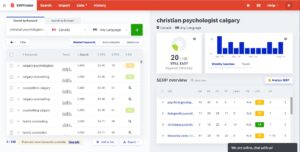The Importance of Keywords
This blog builds on our previous post: “Keywords – What They Are And How To Use Them.” In case you missed it, click on the link and give it a read. It will provide you with the necessary background information for what we’ll be talking about here.
 Now that you know what keywords are and how they work, your next step is to determine which keywords are best related to your niche and some guidelines for applying them in your text. This process is called “keyword analysis.”
Now that you know what keywords are and how they work, your next step is to determine which keywords are best related to your niche and some guidelines for applying them in your text. This process is called “keyword analysis.”
As is the case with any new frontier, you need to familiarize yourself with the territory to know how to navigate it well. When it comes to the internet, just think about how vast that compilation of information is! That’s where keyword analysis comes in. It will help you place yourself on the online map strategically, and it’s one of the most important aspects of SEO.
As mentioned in Keywords – What They Are And How To Use Them, it’s not the number of keywords that will determine the success of your ranking and business; it’s how well you choose and use those keywords. And that’s what keyword analysis and research tools will allow you to achieve.
Keyword research is crucial to ensuring your website’s success: It will help get you on the map in the following ways:
- reaching your target audience
- expertly market your website’s content
- score higher on the SERP to bring in more traffic
- streamlining your niche and understanding your competition.
In truth, the success of your presence online is not necessarily contingent on the quality of your product. Still, the quality of your research to make sure your page is doing what it’s meant to: drawing in traffic and generating the business and return you’re looking for from your site.
Three Ways to Find Keywords
Now that we understand the importance of keyword research and analysis, let’s look at some of the most helpful ways to approach it.
Three “Key” Ways to Find Keywords:
- Brainstorm
- Search Competitor Websites
- Keyword Tools
Brainstorm
Brainstorming Steps:
- Determine your target audience
- Write down the most commonly asked questions and recurring phrases to use as keyword ideas
- Perform a Google search using the words you brainstormed
 When we talk about determining your target audience, that just means reaching the types of people you’re hoping to and that you expect will be interested in what you’re offering. For example, if you have a business selling custom jewelry, and want to pinpoint your target audience, you might ask yourself some questions, such as:
When we talk about determining your target audience, that just means reaching the types of people you’re hoping to and that you expect will be interested in what you’re offering. For example, if you have a business selling custom jewelry, and want to pinpoint your target audience, you might ask yourself some questions, such as:
- What ages are generally interested in what you make?
- Do you make jewellery that certain types of people seem drawn to? For example, does your product draw in artists or musicians? Or young executives? Or other?
Next, you’ll want to acquire a feel for words or phrases typical for your niche. These are words that will be commonly entered into search engines when it comes to your particular theme and topic. Some of the steps needed to determine this will come through technical applications (which we’ll talk about further below). But you can start by merely employing your logic and creativity.
First off, draw upon your personal experience.
 Think about your experiences with clients and the questions and desires they often ask or express. Next, write down the common questions and recurring phrases or words that come to mind. If we use the same example as above, some of those questions may be: “What kind of material do you use to make your jewellery? How much does it cost? Can I order in bulk? What kind of jewelry do you make?”
Think about your experiences with clients and the questions and desires they often ask or express. Next, write down the common questions and recurring phrases or words that come to mind. If we use the same example as above, some of those questions may be: “What kind of material do you use to make your jewellery? How much does it cost? Can I order in bulk? What kind of jewelry do you make?”
Secondly, sit yourself down at your computer and do a search for your target keywords based on those words and ideas.
Take note of which words brought up similar material to yours and which ones didn’t. You’ll also notice when you type in your search queries, Google will show you related keywords beneath the search bar. Take note of these as well, because you can use these in your material to help your page rank higher.
Find Search Competitors Sites
Another way to find the best keywords is to search for similar websites in your niche.
 Just type your main keyword into the search bar, and Google will show you various relevant URLs. You’ll want to pay attention to the ones that rank the highest and look over their pages to get an idea of the most commonly recurring words or phrases to know what keywords are helping them rank well. However, you can save yourself a lot of time and energy by minimizing the manual approach just described in favor of an online tool commonly referred to as a rank checker. It will do the work for you, so you’ll know what keywords your competitors are ranking for.
Just type your main keyword into the search bar, and Google will show you various relevant URLs. You’ll want to pay attention to the ones that rank the highest and look over their pages to get an idea of the most commonly recurring words or phrases to know what keywords are helping them rank well. However, you can save yourself a lot of time and energy by minimizing the manual approach just described in favor of an online tool commonly referred to as a rank checker. It will do the work for you, so you’ll know what keywords your competitors are ranking for.
Keyword Research Tools
Beyond the rank checker, other tools are available to target keywords and accomplish SEO. These are referred to as keyword research tools or keyword analysis tools.
The essential features of keyword research tools include the following:
- Show search volume results
- Suggest alternative keywords
- Display paid keywords
- Trends
- Display keyword difficulty and competition
Let’s look at these in more detail, as well as some other features that more elaborate tools provide for keyword research.
Features of Key Analysis Tools
Search Volume
 As stated above, keyword analysis tools provide data for the search volume of keywords. Search volume refers to how often specific words are expected to come up in searches within a given period of time. This is a foundational part of keyword analysis, but it needs to be applied alongside search intent. Remember, unless keywords are user-specific, you’ll get a lot of potential traffic, but it won’t necessarily translate into business. For example, the word “stain” might come up many times, but if you are selling paint stain, and some of the search volume for that is related to another use of the word “stain,” such as “stain removers,” you’re not getting an accurate picture.
As stated above, keyword analysis tools provide data for the search volume of keywords. Search volume refers to how often specific words are expected to come up in searches within a given period of time. This is a foundational part of keyword analysis, but it needs to be applied alongside search intent. Remember, unless keywords are user-specific, you’ll get a lot of potential traffic, but it won’t necessarily translate into business. For example, the word “stain” might come up many times, but if you are selling paint stain, and some of the search volume for that is related to another use of the word “stain,” such as “stain removers,” you’re not getting an accurate picture.
You’ll also need to consider your potential keywords in light of your competition. For example, the word “music.” You’re going to have a lot of people searching for that, but you’re also going to have a lot of competition because it’s such a common word. For that reason, the chances of using it effectively to get people to your pages is going to be very slim. The same goes for keywords that are not being searched for often. There are some cases where, no matter how you frame it, those words are not going to bring in any value because they just aren’t being utilized in the searches people are doing. The search volume feature can help you pinpoint when this is the case and save you time and frustration in keyword choices.
CPC (Cost Per Click)
 Some keywords will rank organically because of their natural occurrence in a text. However, search engines also offer users the option of paying for keywords to rank higher.
Some keywords will rank organically because of their natural occurrence in a text. However, search engines also offer users the option of paying for keywords to rank higher.
The purchaser pays a fee to Google each time ads with those words are clicked. That fee will be minimal in comparison to the business it can potentially bring in, so people pay to get the keywords that will work for them to bring in a high yield.
Naturally, there are usually several pages competing for the same keyword. It’s up to Google Adwords (or Bing) to decide which bidder will rank at the top. Google looks at several criteria to determine this and it all begins with allowing purchasers to bid on the keyword. The bid they give reflects the maximum amount they’re willing to pay when that keyword is clicked (though sometimes Google may charge them less than their bid).
Google then calculates an “Ad rank” for each bidder using metrics, including but not limited to the amount of each bid, how well the landing page reflects the keyword, the quality of the ad and more.
Using a keyword research tool will show you the CPC (cost per click) for keywords and what words businesses are paying the most for. Take note of these because that means these words have a good return to bring in traffic and have the potential to help your own page rank higher. At the same time, however, when there are a lot of competitors using the same keywords, this will increase the keyword difficulty. (We’ll talk about keyword difficulty more below).
Trends and Seasonality
 Some keyword research tools will also show the trend of a keyword.
Some keyword research tools will also show the trend of a keyword.
The trend feature will allow you to see how keywords rank over a period of time, including any fluctuations. Some will score higher in different time periods than others. That’s why it’s important to not simply research keywords, but also their historical context as well as future and present projections.
For example, if you only see a keyword in the present month, and it’s ranking low, you might discard it. But if you dig deeper, you might see the projections showing that this word is trending upward. Here is one possible scenario to explain further: Imagine a life coach has a website and one of the things they offer coaching for is “stress management.” Although that particular keyword may score well all year round, you can capitalize on it by incorporating trends. For example, if the economy has just hit a recession, you might change your keywords from “stress management” to “managing stress during a recession.” Modifying the keyword so that it follows the trend in that way would mean a lot more traffic than it may have just a few months prior when the economy was doing better.
In some scenarios, there will be a seasonal aspect that comes into play with keyword trends. For example, the words “Christmas wreath” may rank high during the Christmas holidays, but not so high during the summer months.
Keyword Difficulty
Now let’s look at the aspect of “keyword difficulty” or “keyword competition. This feature will show how difficult it will be to rank well for the keywords you want to implement.
Keyword difficulty will utilize the aspects we spoke about above to calculate its results. It’s a helpful tool in narrowing things down more than you would be able to through manual research alone. One way it does that is by analyzing the search volume of a word to determine the difficulty of utilizing your keyword to bring in traffic. For example, if the search volume of a word is high, this feature will help project if that will mean more traffic to your page or if the search volume is so high that it will be very difficult to compete for and not that worthwhile to include in your page.
Google’s Keyword Planner
There are a few options to choose from to utilize the above facets in the form of keyword analysis.
 One of the most well known (and long-standing) free keyword
One of the most well known (and long-standing) free keyword
research tools is Google’s Keyword Planner (formerly known as Keyword Tool). The Keyword Planner will give you a general idea of search volume so you can determine which keywords will rank high and which ones will bring in very little return. It’s available through Google ads. You just need to have an account with Google to acquire it for free.
While it’s a good starting place, the Keyword Planner doesn’t give as broad feedback as some other tools do. However, you can use it along with Google Trends to get a more complete picture of things.
Google Trends is also a free tool that will help you with page ranking by doing what the name suggests: showing how keywords are trending or ranking over designated time periods. Like the Keyword Planner, this is also a good starting point in keyword tools. However, keep in mind that this tool doesn’t give exact search volume and only gives estimations for keyword ranking. It’s also limited in the number and variety of keywords it will offer. So although it can be helpful, it might not get you the kind of results you’re hoping for.
If you’re really serious about getting the best return possible for your page, you might want to also look into other tools that have since been developed and will give you a greater yield. Not all of them are free, but depending on your goals, this can be well worth the investment. At Pathways, we recommend a more extensive tool, such as our personal favourite: KWFinder. We also offer the option of having us do the work for you. Our team has an understanding of how this tool can be utilized effectively to track trends and capitalize on that to get your pages ranking higher. Please feel free to contact us if you are interested in learning more.
KWfinder For Finding Keywords
 There are several reasons why we prefer KWFinder. First off, it was created by Mangools (a highly reputable source). It stands out for its ease of use, especially for those unfamiliar with keyword research tools. We also find the results it gives to be more fine-tuned than some other keyword tools, including those by Google. One of the features that makes it really good that way is that it will show keywords that are specific to a particular location. And it offers the more common features we talked about earlier, including things like trends and search volume.
There are several reasons why we prefer KWFinder. First off, it was created by Mangools (a highly reputable source). It stands out for its ease of use, especially for those unfamiliar with keyword research tools. We also find the results it gives to be more fine-tuned than some other keyword tools, including those by Google. One of the features that makes it really good that way is that it will show keywords that are specific to a particular location. And it offers the more common features we talked about earlier, including things like trends and search volume.
As mentioned earlier, Google Trends is a free tool that will help you with page ranking in relation to trends. However, keep in mind that this tool doesn’t give exact search volume and only gives estimations for keyword ranking. It’s also limited in the number and variety of keywords it will offer. So although it can be helpful, it might not get you the kind of results you’re hoping for. This is another reason why we recommend a more extensive tool, such as KWfinder. At Pathways, we understand how this tool can be effectively applied to track and capitalize on using trends to get your pages ranking higher.
Testing Your Keywords
 After doing the necessary research and analysis for keywords, your next step will be to compose a text that utilizes them well. And then, once you’ve got your material online, you’ll want to do some testing over time, to see how your page is ranking. You can do this simply by typing in your keywords on Google or another search engine and seeing how the SERP is responding.
After doing the necessary research and analysis for keywords, your next step will be to compose a text that utilizes them well. And then, once you’ve got your material online, you’ll want to do some testing over time, to see how your page is ranking. You can do this simply by typing in your keywords on Google or another search engine and seeing how the SERP is responding.
If you’re not happy with the results, you can always review and make some changes to improve how you’re using keywords on your site. It can take a few months sometimes for this to make a difference in your rank, especially if your keywords are competitive. So just keep checking back, and over time a difference should result.
Once your page has been up for a while, you can use the following measuring tools to help you further: Google Analytics and Google Search Console. They will allow you to determine which keywords are working to bring in traffic and resulting in consumer interest and sales.
Let Us Know How We Can Help
If you want to take it a step further to maximize your SEO using keywords, you can invest in hiring a professional who knows how to implement keywords strategically, which is what we offer all our clients here at Pathways. Remember, people need to see your page to click on it. A skillful and strategic application of keywords is foundational towards making that happen and getting you the online results that you’re aiming to achieve.
Since keyword analysis incorporates several areas of data, the more skilled you are at interpreting that combination of data to apply it, the better your chances are to rank higher. Our team at Pathways has the know-how to assist you with this. As well, our writers are also skilled at including your target keywords and LSI keywords into the content we write. All of this means we can help you rank much higher in the SERP while also saving you time and work on your end of things. Please feel free to get in touch with us. We’d be happy to help.
that combination of data to apply it, the better your chances are to rank higher. Our team at Pathways has the know-how to assist you with this. As well, our writers are also skilled at including your target keywords and LSI keywords into the content we write. All of this means we can help you rank much higher in the SERP while also saving you time and work on your end of things. Please feel free to get in touch with us. We’d be happy to help.

